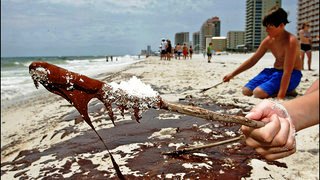Florida counties are deciding how to spend their share of a settlement of more than $20 billion stemming from the explosion of the Deepwater Horizon oil drilling rig in 2010.
The explosion of the Deepwater Horizon off the coast of Louisiana killed 11 workers and sent more than 134 million gallons of oil into the Gulf of Mexico, the worst ecological disaster in U.S. history.
Five states along the Gulf Coast — Florida, Texas, Louisiana, Mississippi and Alabama — are sharing more than $20 billion of settlements with companies including BP, Transocean and Halliburton. BP will pay most of the money over a 17-year period.
Part of the money will go to 23 Florida counties from Escambia County in Florida’s Panhandle region to Monroe County in the Keys.
The 23 counties will split approximately $308 million of direct restitution from BP, including about $230 million that will go to five counties in the Panhandle where the oil spill had its biggest impact.
Transocean already has made $45 million of settlement money available to the 23 counties.
The counties have varied plans for spending the oil-spill settlement money, ranging from preserving bird habitats in the Everglades to building boat ramps and parks.
Audubon Florida, The Nature Conservancy and other environmental organizations are monitoring some of the county projects and leading others in cooperation with the National Fish and Wildlife Foundation.
The bulk of Florida’s settlement money will go to eight counties where the 2010 disaster deposited oil and tar on beaches: Bay, Escambia, Franklin, Gulf, Oskaloosa, Santa Rosa, Wakulla and Walton.
The other 15 counties include Charlotte, Citrus, Collier, Dixie, Hernando, Hillsborough, Jefferson, Lee, Levy, Manatee, Monroe, Pinellas, Sarasota, Taylor and Walton.
In Escambia County, settlement money already has gone into improvements to a public marina and park, construction of boat ramps, and restoration of oyster beds and beaches.
Other counties have set spending priorities but have not settled on spending plans.
Monroe County, for example, expects to use some of the funds for preservation of vulnerable coral reefs.
Hillsborough County commissioners decided to wait a year or longer to spend settlement money. Their decision was intended to ensure the best use of the money and to avoid using it simply to plug holes in the county budget.
Darryl Boudreau, director of local government relations for The Nature Conservancy in Florida, said the county projects under consideration are encouraging: “We are seeing a commitment to investing in projects that provide long-term benefits.” [Associated Press] — Mike Seemuth
